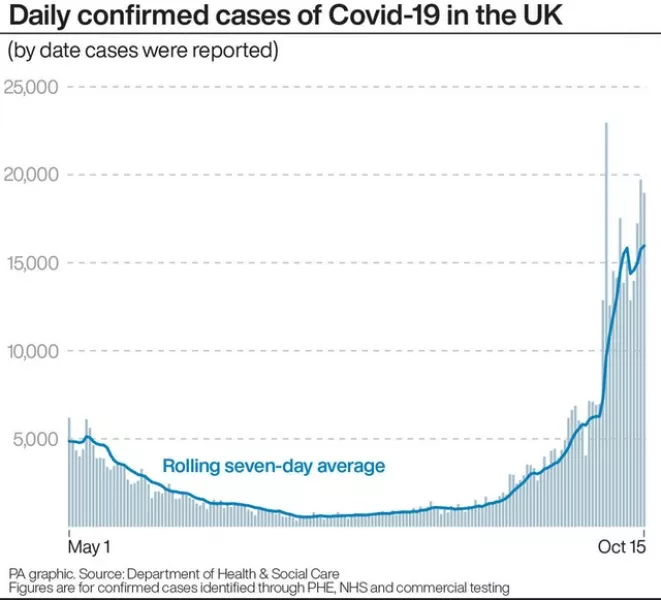The Medical Research Council (MRC) biostatistics unit at Cambridge University published new predictions on October 12th on how fast the epidemic is growing across England.
They estimate cases are doubling in under seven days, with a “substantial proportion” of those being asymptomatic.
The figures are fed to the Scientific Pandemic Influenza Group on Modelling, which provides real-time information to the UK government through the Scientific Advisory Group for Emergencies (Sage) and to regional Public Health England (PHE) teams.
This means that the number of infections grows by 9 per cent each day and it translates into a doubling in number in under one week
On October 12th, the MRC unit published a report saying: “Our current estimate of the number of infections occurring each day across England is 47,000.
“We predict that the number of deaths each day is likely to be between 240 and 690 on October 26th.”
They said the daily number of infections was within the range of 28,900 to 74,900 per day, with the best estimate being 47,000.
They added the estimated growth rate for England is 0.09 per day.
“This means that the number of infections grows by 9 per cent each day and it translates into a doubling in number in under one week,” they said.
“The central estimates for the number of new infections is particularly high in the North West and the North East and Yorkshire (17,600 and 10,700 infections per day, respectively), followed by London and the Midlands (5,450 and 5,720, respectively).

“Note that a substantial proportion of these daily infections will be asymptomatic.”
The latest UK government figures showed 18,980 lab-confirmed new coronavirus cases in England as of 9am on Thursday, while a further 138 deaths were reported.
Experts say lab-confirmed cases do not represent the true scale of the epidemic.
Meanwhile, Professor Graham Medley, an expert in infectious disease modelling at the London School of Hygiene and Tropical Medicine and a member of Sage, has said he believes that in terms of healthcare, “some areas are going to be back to the same kind of position they were at the end of March”.
He told BBC Radio 4’s Today programme: “We are struggling at the moment to understand how we’re balancing that imperative of having to prevent healthcare being completely overwhelmed and yet how to mitigate against the damage caused by the intervention, which of course is huge.”







